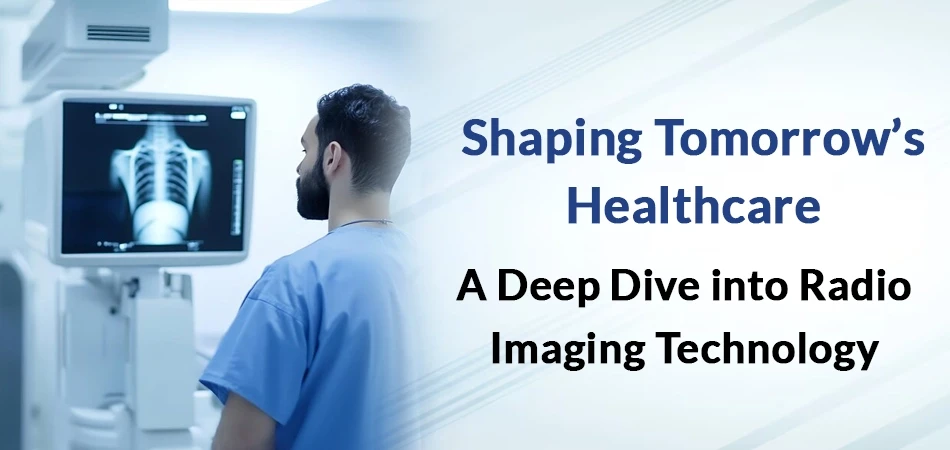Shaping Tomorrow’s Healthcare: A Deep Dive into Radio Imaging Technology

In the constantly changing healthcare industry, radio imaging technology course leads to diagnostic advancements. With the increasing focus on data and patients in medicine, the need for skilled professionals in this area is higher than before. Earning a Bachelor's degree in Radio Imaging Technology not only provides students with the necessary technical skills but also prepares them to play a significant role in influencing the direction of healthcare in the future. In this blog post, we will examine the importance of this degree, its course content, and the potential job prospects it offers.
What is Radio Imaging Technology?
Radio imaging technology encompasses various diagnostic imaging techniques that use radiation to create detailed images of the body. This includes modalities such as X-rays, MRI (Magnetic Resonance Imaging), CT (Computed Tomography), and ultrasound. These imaging techniques are vital for diagnosing medical conditions, guiding treatment plans, and monitoring patient progress.
Eligibility:
- To be admitted to his class, you need to have completed your 10+2 in a science field and achieved an Aggregate of 55% marks.
- The eligibility requirements can differ among universities and institutions since they administer entrance exams that you need to study for to enrol in the BRIT course.
What is the syllabus for the BRIT Course?
First Year B.Sc. Radio Imaging Technology Course
1. Gross Radiological & Surface Anatomy of the Human Body
2. Physiology & Pathology of Human Body Systems
3. Radiographic Techniques & Dark Room Procedures
4. Basic Radiation Physics & Principles of Radiotherapy
Second Year B.Sc. Radio Imaging Technology Course
1. Modern Imaging & Recent Advances
2. Apparatus of Imaging, Radiotherapy & Quality Assurance
3. Physics Of Radiotherapy
4. Radiation Protection & Monitoring
Third Year B.Sc. Radio Imaging Technology Course
1. Special Radiological Procedures & Contrast Media
2. Special operations of different body organs
3. Radiotherapy planning & Techniques
4. Radiation Dosimetry- Principles & Applications
5. Hospital Practice & Care of Patient
What is the Importance of a Bachelor’s Degree in Radio Imaging Technology?
1. Comprehensive Skill Development
A Bachelor’s in Radio Imaging Technology provides a well-rounded education that combines theoretical knowledge with hands-on training. Students learn about:
- Radiation Safety: Understanding how to protect patients and staff from unnecessary exposure.
- Image Acquisition Techniques: Mastering the use of various imaging modalities.
- Patient Care and Communication: Developing skills to interact effectively with patients and healthcare teams.
2. Staying Current with Technological Advances
Advancements in imaging technology, including digital imaging, artificial intelligence, and teleradiology, are quickly progressing. A Bachelor's degree program ensures students are knowledgeable in current technologies and methods, readying them to adjust to industry changes.
Curriculum Overview
A typical Bachelor’s program in Radio Imaging Technology includes a mix of classroom instruction and clinical experience. Key components often include:
1. Hands-On Training
Clinical internships are an essential component of the program, enabling students to acquire hands-on experience in healthcare environments. This interactive training is crucial for acquiring the necessary skills to conduct imaging procedures with precision and security.
Career Opportunities
Graduating with a Bachelor’s in Radio Imaging Technology opens the door to a variety of career paths:
1. Radiologic Technologist
As a radiologic technologist, you will perform diagnostic imaging procedures, ensuring high-quality images for interpretation by physicians.
2. MRI Technologist
Specializing in MRI, you will use magnetic fields and radio waves to create detailed images of organs and tissues.
3. CT Technologist
In this role, you will operate CT scanners to produce cross-sectional images of the body, aiding in the diagnosis of various conditions.
4. Radiation Safety Officer
With additional training, you could oversee safety protocols and compliance in imaging facilities, ensuring a safe environment for patients and staff.
Conclusion
If you are passionate about technology and healthcare, pursuing a BRIT program degree in Radio Imaging Technology could be the perfect choice for you. Embrace the opportunity to shape tomorrow’s healthcare and make a meaningful difference in the lives of patients! Ganesh Paramedical College also offers a CRIT program that trains individuals to be vital paramedical health professionals who can diagnose and treat patients in medical environments.
Overview
| Course Name | Bachelor of Science in Radiology and Imaging Technology |
| Course Level | Graduate |
| Course Duration | 3 years |
| Course Type | Semester-wise/ Yearly |
| Eligibility | Graduate in science stream with at least 50% aggregate |
| Admission Process | Merit-based / Entrance-exam based |
| Average Fees | 2,40,000 |
| Average Salary | INR 3 to INR 20 LPA |
| Top Recruiting Areas | Public and Private hospitals, Radiology Centers, clinics, medical labs, diagnostic centres, research institutes |
| Top Job Positions | Marketing Executive, Radiographer, medical advisor, Imaging Research assistant manager, sales manager, X-ray technician etc. |
| Top Recruiters | Max Healthcare, HLL Life Care Limited, Fortis Hospital etc. Students have also a chance to make their career abroad after this course. |
People may ask
What is a BRIT course?
BRIT stands for Bachelor in Radio Imaging Technology this course will help you to provide detailed knowledge of the Radiological Lab techniques and provide many job opportunities to the student.
What are the Career opportunities after completing the BRIT course?
After completing this course you can become a Radiological Lab assistant, research analyst, Radiological Nurse, PhD in radiology Medical officer etc.
What is the average to be expected after completing this course?
The average salary ranges from 2.5- 6 lakhs depending upon the post and rank.
How to get an inquiry for this course?
You can contact us at PH No-011-47444444 Call Centre NO-011-47333333, Mobile No-9810183948.

